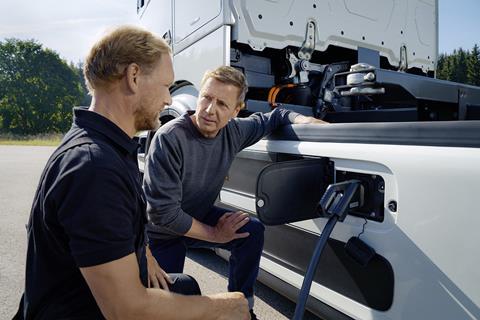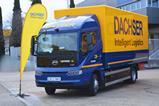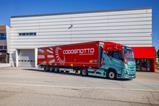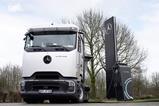Daimler Truck plans to build Europe’s largest semi-public charging network — by letting fleets plug in at someone else’s depot.
The truck manufacturer announced plans to establish a new semi-public charging network for electric heavy-duty vehicles under the TruckCharge brand. The plan includes more than 3,000 fast-charging points across Europe by 2030, addressing what Daimler Truck describes as a major shortfall in infrastructure for battery-electric trucks.
TruckCharge introduces a model that allows depot operators to offer their charging infrastructure to third-party fleets when not in use. These charging sessions would be paid for by third-party users, creating a new revenue stream for depot owners while expanding access to charging for electric truck operators who lack infrastructure of their own. The network will consist of both Daimler Truck-owned sites and charging infrastructure hosted at customer depots.
“With our TruckCharge concept for semi-public charging, we are aiming to close a large gap in the charging infrastructure for trucks. With more than 1,000 dealers in Europe alone, we have the best prerequisites to quickly build up our own network,” said Martin Hink, Head of eMobility/H2 Business Solutions at Mercedes-Benz Trucks.
Daimler Truck stresses that the TruckCharge model is designed to complement — not replace — public charging facilities.
The concept, which is scheduled to launch in the third quarter of 2025, includes a digital platform allowing fleet operators to plan routes, reserve charging slots, and make payments in advance. The same platform will enable depot owners to manage availability and generate income from underutilised chargers, potentially helping them recoup infrastructure investments more quickly.
Daimler Truck adds that TruckCharge services will be offered irrespective of truck brand, acknowledging that many fleets operate mixed vehicle types. The company also confirmed that its existing Mercedes ServiceCard will remain valid for public charging through the UTA Edenred network, which currently includes charging points in Germany, Austria and France, with more markets to follow later this year.
The truck manufacturer has not yet confirmed whether the United Kingdom is included in the planned 3,000-site network.



















